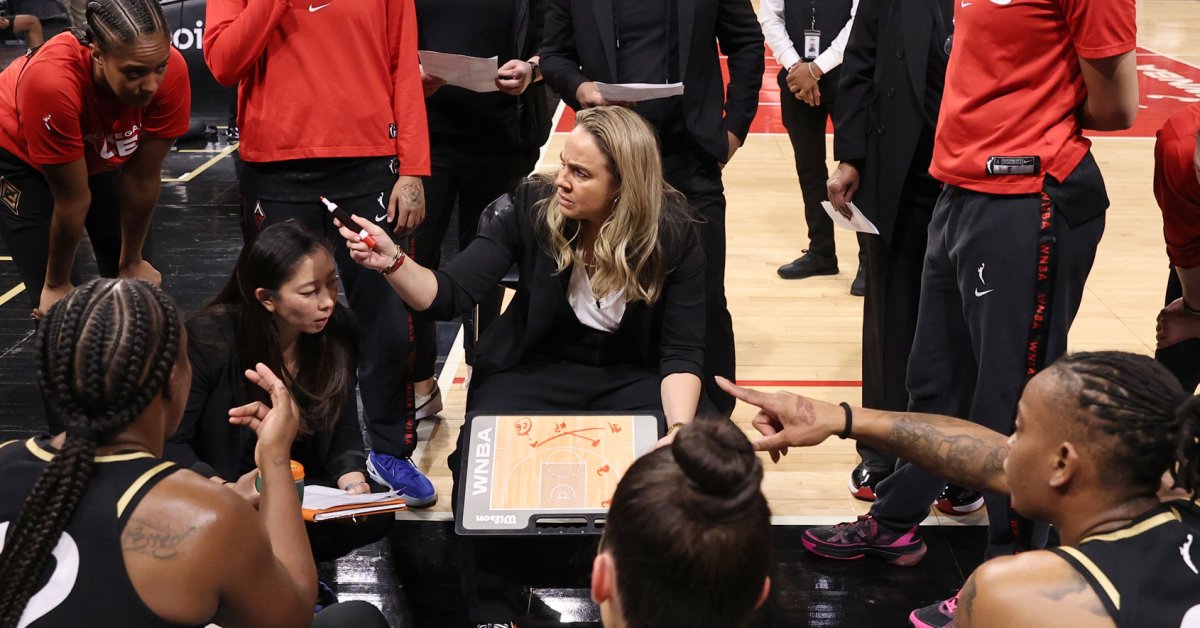
Las Vegas Aces coach Becky Hammon knows her team has it good. They just concluded their second day of training camp for the 2023 season in a gleaming new $40 million, 64,000- square-foot facility, the first standalone practice site and headquarters for a WNBA team in the league’s 26-year history. Amenities include TVs and Mac mini-computers in each locker, hot and cold plunge pools, massage tables, an infrared sauna, and cryotherapy.
But as per the unwritten commandments of her profession, Hammon takes a minute to bring up the negative. “I wasn’t happy about the defense out there,” she says during an elevator ride to her still largely unfurnished office, where the Aces playbook and other pieces of paper with offensive sets drawn on them overrun her desk. She’s hung a few small basketball hoops on the wall so that visitors, especially her two children, ages 7 and 5, can shoot a Nerf ball at the plastic rims.
“Have you seen this?” she asks, directing me to a space right outside overlooking the two practice courts. Her players are still milling about, taking foul shots, chatting, getting treatment from trainers. Hammon beams. The scene at Aces headquarters feels so distant from the days when women’s pro players wrapped their own knees and, if they were lucky, got to share training spaces with their NBA counterparts. Candace Parker, one of the greatest players in WNBA history, has said one reason she signed with the Aces this year was that for the first time in her career, she’d have a permanent locker with her name on it.
Read More: The Most Influential People of 2023: Brittney Griner
“At the end of the day, these players just want places they can go to just get shots up whenever they want,” says Hammon, 46, leaning against a railing. “Be in a safe environment and have rebounders and whatnot. Stuff in the locker. It’s just these little simple things that you think are so basic. But they just haven’t had ‘em.”
Hammon, who last season became the first rookie WNBA coach to take a team to the title, leads an organization pouring unprecedented investment into women’s basketball, at a moment when the sport feels especially ascendant. Another WNBA team, the Seattle Storm, has broken ground on its own $64 million practice space. Both the Aces and the New York Liberty made splashy off-season moves. The Aces inked Parker and forward Alysha Clark, a two-time WNBA champion (while also adding Tom Brady as a minority owner). New York signed former WNBA MVP and two-time champion Breanna Stewart and point guard Courtney Vandersloot to free-agent deals and traded for 2021 WNBA MVP Jonquel Jones. The flurry of activity sparked debate about the costs and benefits of WNBA “superteams”—a conversation that has boosted fan engagement for the NBA for years and appears to be doing the same for the W. Viewership for April’s WNBA draft was the highest in 19 years, up 42% over last year’s total. Brittney Griner’s return to the court for the Phoenix Mercury, after her 10-month imprisonment in Russia, should draw more eyeballs. Plus, momentum for women’s basketball is growing at the college level: this year’s women’s Final Four, capped by LSU’s Angel Reese talking trash to Iowa’s Caitlin Clark in the championship game, created more buzz than the men’s event.
Adding to the intrigue is Hammon, a trailblazing force in American sports. After 16 years as an underestimated, 5 ft. 6 in. WNBA point guard, she was hired as an assistant coach by the San Antonio Spurs in 2014, making her the first female full-time coach in the history of the four major North American sports leagues (NBA, NFL, NHL, MLB). In 2015, she served as head coach for the Spurs’ summer-league team and won a championship, the first woman to do so. In 2020, she became the first woman to serve as head coach during the NBA regular season when she took over for longtime Spurs head coach Gregg Popovich, a five-time NBA champion, in a game after he was ejected.
Assistant coach Becky Hammon and head coach Gregg Popovich on the court during a San Antonio Spurs game in 2017.
David Zalubowski—AP
Hammon spent eight years as an assistant for the Spurs and interviewed for so many head-coaching positions, she’s lost count. “I can’t even guesstimate,” she says, reclining in her cushy desk chair. While many Popovich lieutenants have secured head-coaching gigs, she’s been passed over every time. She notes that she’s spent a quarter-century in professional basketball. “It’s just people that want to discount 16 of them,” says Hammon, referring to her years suiting up in the WNBA. “If you give me my 16 years as a player that you do to any of these other people, all of a sudden I jump to the top of the list right away.” Former NBA point guards like Doc Rivers (13 seasons), Jason Kidd (19 seasons), and Chauncey Billups (17 seasons) all got their first head-coaching gigs with little to no assistant-coaching experience. “If I had a 16-year NBA career and my name was Brian, I’d probably be hired and fired a couple of times by now,” she says.
So Hammon made the jump to the WNBA last season, scrapped the Aces’ antiquated playbook to install a flowing pace-and-space style familiar in the NBA, and immediately won the first title in franchise history. (The Aces played in Utah as the Starzz from 1997 to 2002, then relocated to San Antonio as the Silver Stars, and later just the Stars, from 2003 to 2017 before moving to Las Vegas.) Hammon will enter the Naismith Basketball Hall of Fame in August, along with NBA greats Dwyane Wade, Dirk Nowitzki, and her mentor Popovich. “She is overqualified,” says Aces guard Kelsey Plum, “to be an NBA coach.”
Read More: The Most Influential People of 2023: Mikaela Shiffrin
The new season starts May 19, with the Aces returning as champions but also facing two investigations by the WNBA, one related to the salary cap and the other related to allegations of mistreatment by a pregnant player who was traded. Meanwhile, Hammon remains on the NBA’s radar. In April, days before the start of WNBA training camps, the Toronto Raptors reached out to Hammon’s agent about their vacant head-coaching position. In the immediate or near future, it would seem, Hammon may have to make a choice. She can play a key role in growing the popularity of the WNBA. Or she can embrace the role of historic figure, breaking a glass ceiling and becoming the first woman to coach a group of men in a major sports setting.
Hammon insists the latter isn’t necessarily the obvious call. “My happiness is most important,” she says. She points out that the NBA’s 82-game grind, for example, is punishing for any parent of young children; the WNBA’s 40-game schedule, which spans summer vacation, is much more family-friendly. “I love being here,” she says. “I love being back on the women’s side. I don’t need the stamp of approval from the NBA.”
Hammon grew up in Rapid City, S.D., near the Black Hills mountain range. Her father Marty ran a fire-sprinkler company, and her mom Bev was a realtor. The Hammons were an outdoorsy family; they hunted, fished, and went camping. “Her and her brother used to take off into the wild and ride four-wheelers, three-wheelers,” says Marty. “Gone all day. Back of the woods. Come back covered with mud.”
She’d spend hours playing basketball with her dad and older brother Matt on a concrete slab in their front yard. On snowy days, she’d grab a shovel to clear the court. Her first memory of organized basketball was sixth grade, losing a game to one of the better schools in the area. “I remember that one because my mom thought we were getting screwed by the refs,” says Hammon. “She was next-level hot.”
Despite her stellar high school stats—Hammon averaged 26 points, 5 steals, and 4 rebounds per game as a senior—few college recruiters journeyed to Rapid City to scout her. Some dismissed her as too small and slow. “Average white girl,” one assistant coach wrote in his evaluation. “It’s the story of my life,” says Hammon. “Not getting picked.”
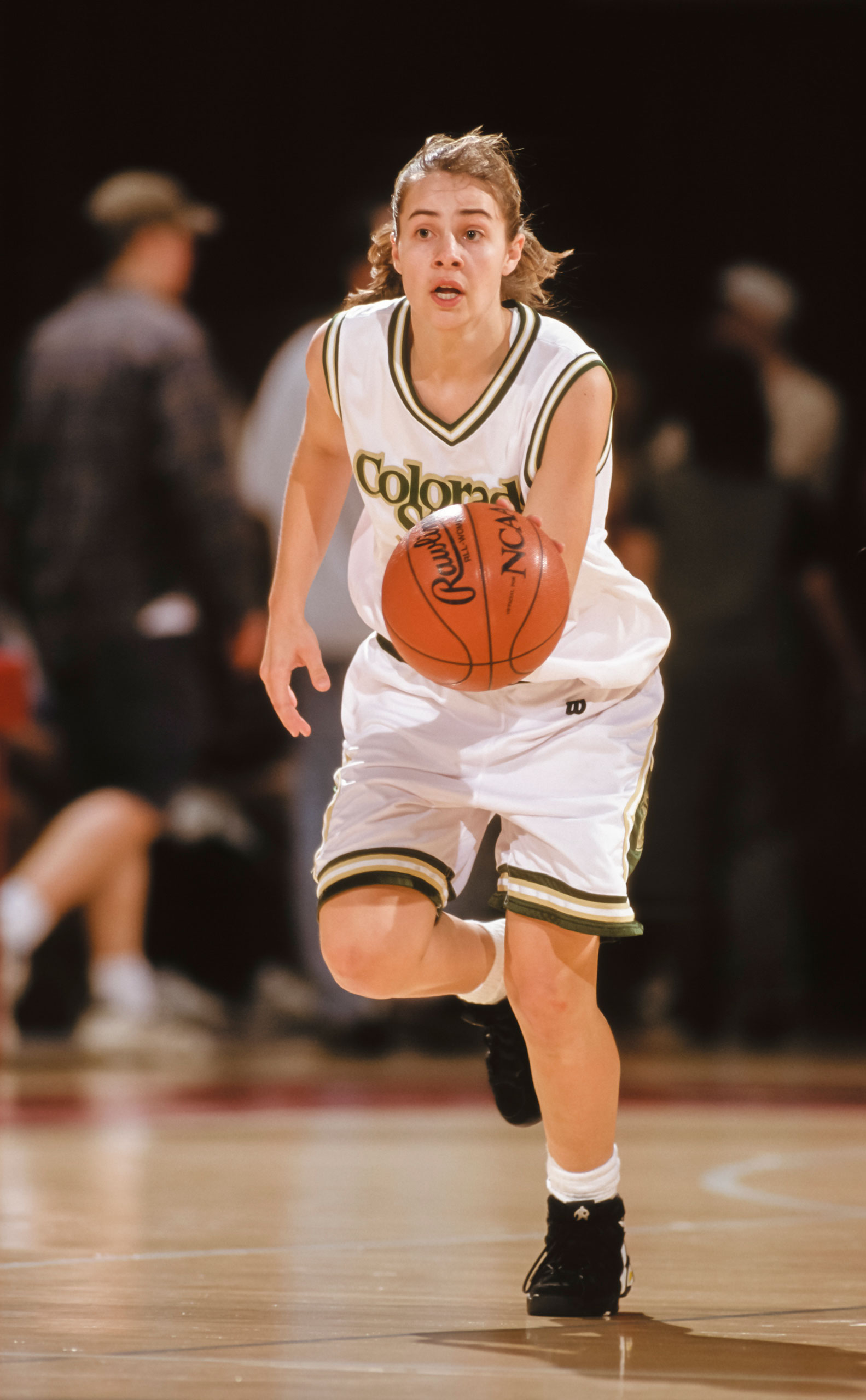
Hammon playing for Colorado State in a first round game of the NCAA tournament in March 1996.
David Madison—Getty Images
Colorado State, however, took a flier on Hammon, and in 1996 she was the highest-scoring freshman in the nation, averaging 19.2 points per game. Hammon led the Rams to three NCAA tournaments, including a Sweet 16 appearance. “She had endless range,” says Los Angeles Sparks coach Curt Miller, who was an assistant at Colorado State during Hammon’s senior year. “She was a tremendously accurate three-point shooter. But the underrated part of her game was her uncanny ability to be crafty and creative around the rim. To use angles and spins to finish so well in traffic for someone that was only 5 ft. 6 in. Her offense was off the charts.” She scored 2,740 points at Colorado State, still the most in Western Athletic Conference history, woman or man. She was named first-team All-American in 1999.
Those honors weren’t enough, however, for a WNBA team to select her in that year’s draft. “I remember going with my assistant coaches at the time to Perkins or Applebee’s or whatever,” says Hammon. “I was just crying.” The Liberty invited her to camp as a free agent and she played her way onto the roster. Over the next eight seasons, Hammon emerged as the face of the franchise, helping New York reach three WNBA finals. The Liberty traded her to San Antonio in 2007; that season, she finished second in MVP voting.
Still, Team USA did not initially invite her to try out for the 2008 Olympic team. Russia, however, wanted her to play on its squad: Hammon was spending her WNBA offseasons playing there on lucrative contracts and had become a naturalized citizen. She decided to play for Russia. U.S. women’s basketball coach Anne Donovan called her unpatriotic. Others piled on. “My biggest mistake was reading the comments online,” says Bev Hammon. “All the negativity and degrading remarks. That is tough for a mom. Very tough. Especially when you know her heart.” During one conversation, Bev told her daughter how people were calling her a traitor. In her day, you were better dead than red. “I was like, ‘Mom, is one thing they’re saying true?” says Hammon. No, Bev responded. “‘So what are you doing? Quit reading it.”
Read More: The Most Influential People of 2023: Patrick Mahomes II
Russia won bronze in Beijing; the U.S. took gold. But Hammon believes the backlash she faced gave her thicker skin that would serve her well when she entered the NBA. “It taught me how to be comfortable in other people’s uncomfortable,” Hammon says.
Hammon’s Russian passport has expired, and she has no plans to go back. “Right now, it’s embarrassing what Russia is doing,” she says. “Just a murderous rampage over there.” The Olympic experience, however, was directly responsible for Hammon, four years later, sitting next to Popovich on a flight home from the London Olympics (Hammon helped Russia finish fourth in 2012; Popovich was in London checking on some Spurs, like Tony Parker of France and Manu Ginóbili of Argentina, who were competing at the Games). Popovich quizzed her on life in Russia, asked her if she’d tell him the truth in a basketball setting, and resolved to hire her as a coach when her playing days were over. A torn ACL ended Hammon’s season in 2013. She retired a year later; Popovich gave her a job.
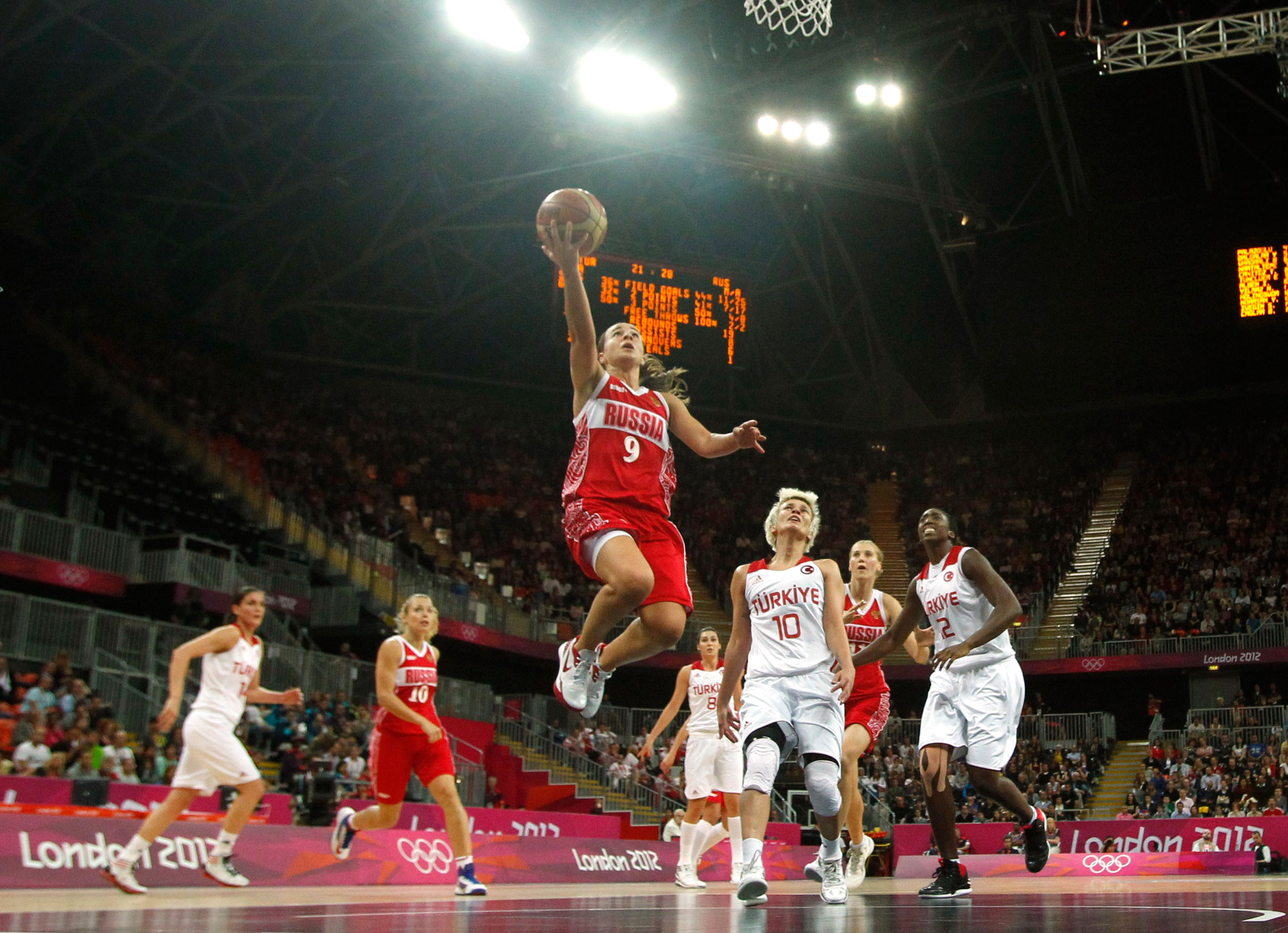
Hammon scoring for the Russian national team during the 2012 Olympic Games in London.
Mike Segar—Reuters
While Hammon can’t think of a single player who disrespected her because of her gender during her eight years in San Antonio, she still faced hostility. Personnel in other organizations, who were competing against her for leadership spots, weren’t exactly thrilled with the attention she attracted. “I hand somebody a clipboard and I’m on SportsCenter,” Hammon says. “Somebody who’s been working in the NBA for 20 years, has been a great assistant, does the same thing, nobody knows his name. So you get some passive aggressiveness or just flat-out fakeness because everybody’s supposed to be so happy that I’m there. But really, it’s kind of like, ugh.”
In NBA head-coaching interviews, she says, executives asked her why she thinks guys will follow her. “It’s like, I don’t know if you’re asking that to all the male coaches, but it seems like a weird question,” says Hammon. “Why am I here if you don’t think athletes would follow me? Because you wouldn’t follow a woman, you’re saying, ‘Why would they follow you?’”
They also asked how she’d conduct her coaching in a men’s locker room. “You learn how to reverse the conversation and be like, ‘Well, why is nobody throwing a fit over Geno Auriemma coaching women?’” she says. “You’re looking for a reason for me not to be there. Sometimes when you put it differently, it’s like, ‘Oh, well, that’s dumb.’”
While Hammon isn’t closing off the possibility of a move down the line, she insists her focus is on the Aces. “You’re going to have to come after me,” she says. “I’m not going to beg for a job anymore.”
It hasn’t escaped Hammon’s notice that men with allegations of misconduct in their past have received opportunities before she has. In 2021, the Portland Trailblazers picked Chauncey Billups, who was accused of rape in 1997 and settled a civil suit with the accuser out of court, as its coach (he has denied the allegations and never faced criminal charges). Also in 2021, the Dallas Mavericks hired Jason Kidd, who in 2001 pleaded guilty to spousal abuse, to his third head-coaching position. Ime Udoka just got a job with the Houston Rockets after the Boston Celtics suspended him due to an improper relationship with a female subordinate.
Hammon considers Billups and Udoka friends and says she doesn’t think anyone should be judged by their worst moments. But, she says, when it comes to hiring decisions, “it’s still better to not be a woman.”
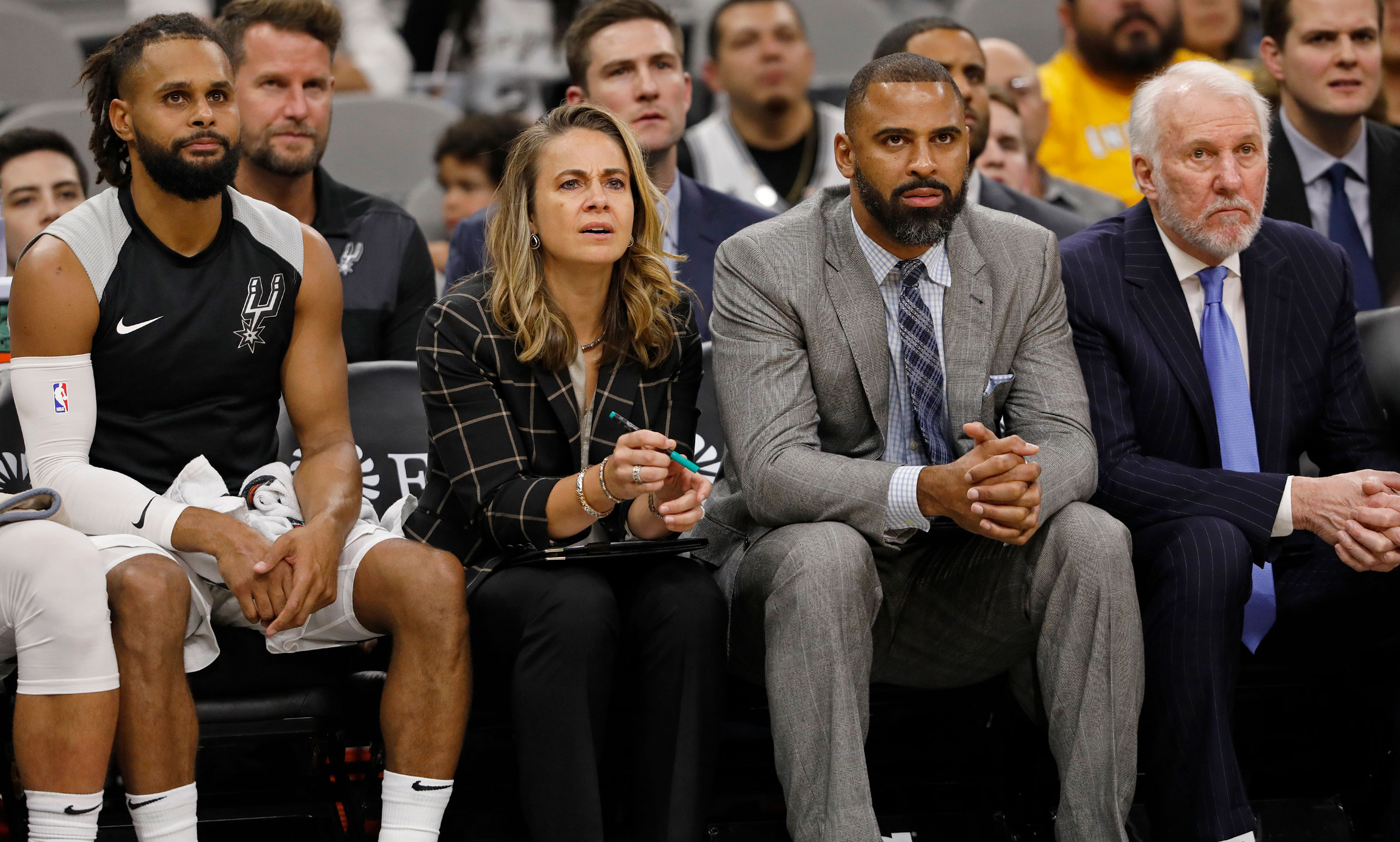
Hammon and Spurs guard Patty Mills on the bench next to head coach Gregg Popovich, right, and assistant coach Ime Udoka, now the head coach of the Houston Rockets.
Edward A. Ornelas—Getty Images
In the WNBA, Hammon hasn’t altered her leadership style. “At the end of the day, leadership is genderless,” she says “And competitive athletes are competitive athletes. If they feel like you can give them information to help them gain an advantage, to help them win, I don’t care if it’s Kermit the Frog telling them, they will listen.”
She’s convinced that NBA front offices, for the most part, are risk averse. “When something’s never been done, or they don’t know how it looks, they’re scared,” says Hammon, with a Texas twang she picked up over all those years in San Antonio. “People don’t like different. And look, I’ve been different my whole life. I don’t look the part. I’m telling you, it helps to look the part.” There’s only so much Hammon can control at this stage. “If I walk in the room and I have the biggest set of balls in the room, it’s not going to work,” she says. “Because it’s going to take somebody that is not afraid to make a hard choice.”
I push back on this point a little bit. The NBA dismisses coaches with impunity; heck, three of the coaches who’ve won the last four NBA titles got fired. An organization that hires Hammon will receive a ton of positive press for breaking barriers. Her appointment is more than justified, given her experience working with Popovich and her championship pedigree in her first year as head coach. And if Hammon doesn’t work out? Well, when it comes to coaching hires, teams whiff more than Little League right fielders. Where, really, is the risk?
“That’s a fair point,” Hammon says. “I guess it’s just the scrutiny.” She mentions the social media buzz over Toronto’s interest: the chatter, Hammon figures, puts undue pressure on the organization. Perhaps they don’t want to deal with it. Plus, other factors could be at play. “You’re going to have a gay woman running your only professional men’s basketball team?” says Hammon. “Probably not. At the end of the day, there are certain parking slots I’m not going to fit in no matter what.”
It’s not that she feels entitled to a top NBA job. “It’s difficult for anybody to get a job in the NBA,” says Hammon. But that doesn’t negate the injustice of the situation and she’s just kind of over it. “You’ve got to get to the point where you’re like, ‘I don’t give a f-ck what you think.’ I know what I know. And I know who I am. And you just keep it pushing.”
The Aces gave Hammon a chance to lead a team, as well as financial security. Mark Davis, who owns the Aces and the Las Vegas Raiders, offered Hammon a deal that pays seven figures per year. Hammon also needed a change of scenery. “Quite frankly, I just got tired of hanging out with guys all the time,” says Hammon. ”All … the time. I do guy vibe. I do guy things. I know guy code. I’ve spent thousands of hours with men. I like men things. Hunting, fishing, diving, shooting things. But I wouldn’t say I’ve ever had a really close colleague.” She mentions former Spurs assistant coach Chip Engelland, who’s now with Oklahoma City, as one of her favorite people. “But it’s just different,” she says.
There’s a lightness to Aces practices. Mistakes aren’t treated as fatal, by either the players or the coaching staff. When Aj’a Wilson, the defending WNBA MVP, misses a three-pointer in a drill, she doesn’t dwell and instead just preps for the next one. “This team just has happy people,” says Hammon. “And you feel that.”
On the men’s side, says Hammon, “I just think they’re more reserved. They kind of have a too-cool-for-school card.” She lists a bunch of former Spurs—Danny Green, DeMar DeRozan, Dejounte Murray, Tony Parker—with whom she had rich conversations. “I love kicking it with them off the court, on the court,” says Hammon. “But it’s a different dynamic.” Salary discrepancies between men and women surely play a role. The average WNBA salary for 2023 is around $105,000, according to Spotrac. In the NBA, it’s $6.6 million. “Each one of them are their own corporate businesses,” says Hammon. “So there’s a team vibe that I really enjoy with the women.”
Her tenure hasn’t come without some controversy. The WNBA is investigating the Aces for circumventing the salary cap. Davis has denied that the team made under-the-table payments to players in violation of league rules. The league is also looking into allegations made by Dearica Hamby that she was “lied to, bullied, manipulated and discriminated against” by her former team. She claims the Aces accused her of signing her contract extension last June knowing she was pregnant. She announced her pregnancy in September and was traded to Los Angeles in January. “To be treated this way by an organization, BY WOMEN who are mothers, who have claimed to be ‘in these shoes,’ who preach family, chemistry, and women’s empowerment is disappointing and leaves me sick to my stomach,” she wrote on Instagram.
When I ask Hammon if she believes she was one of the moms Hamby referred to, she says yes. The trade, says Hammon, “probably feels like very much of a betrayal from me, probably more than anyone, because I had such a great relationship with her. On a personal level, it hurt her feelings and it hurt mine. It’s the worst part of my job, cutting a player or trading a player.” Hammon says she and the organization acted appropriately and the deal was a business decision that would allow the Aces to sign other players.
She may want to cultivate good vibes among the team, but she’s still the boss. Hammon patrols the season’s opening practices in an unzipped hoodie, dirty-blonde hair tied up in a bun. She talks strategy in a firm but conversational manner. “One stat I don’t care about is offensive rebounds,” she tells the Aces. “I love them. But the emphasis is getting back on D.” During a scrimmage, she barks about the less than stellar defensive effort of her starting five. “There’s zero physicality,” she says, chomping on gum. While Hammon stays calm throughout the first two practices, she’s not afraid to lose it on occasion. “She’ll be screaming at us, then she’s like calm and laughs with us,” says Wilson. “Then she goes back to screaming. We don’t know whether to laugh or not.”
“Are there times where I have to step on them and be like, ‘Shut the f-ck up and listen?’” says Hammon. “Yes. And I’ll do that. But overall, I want people that want to come to work every day.”
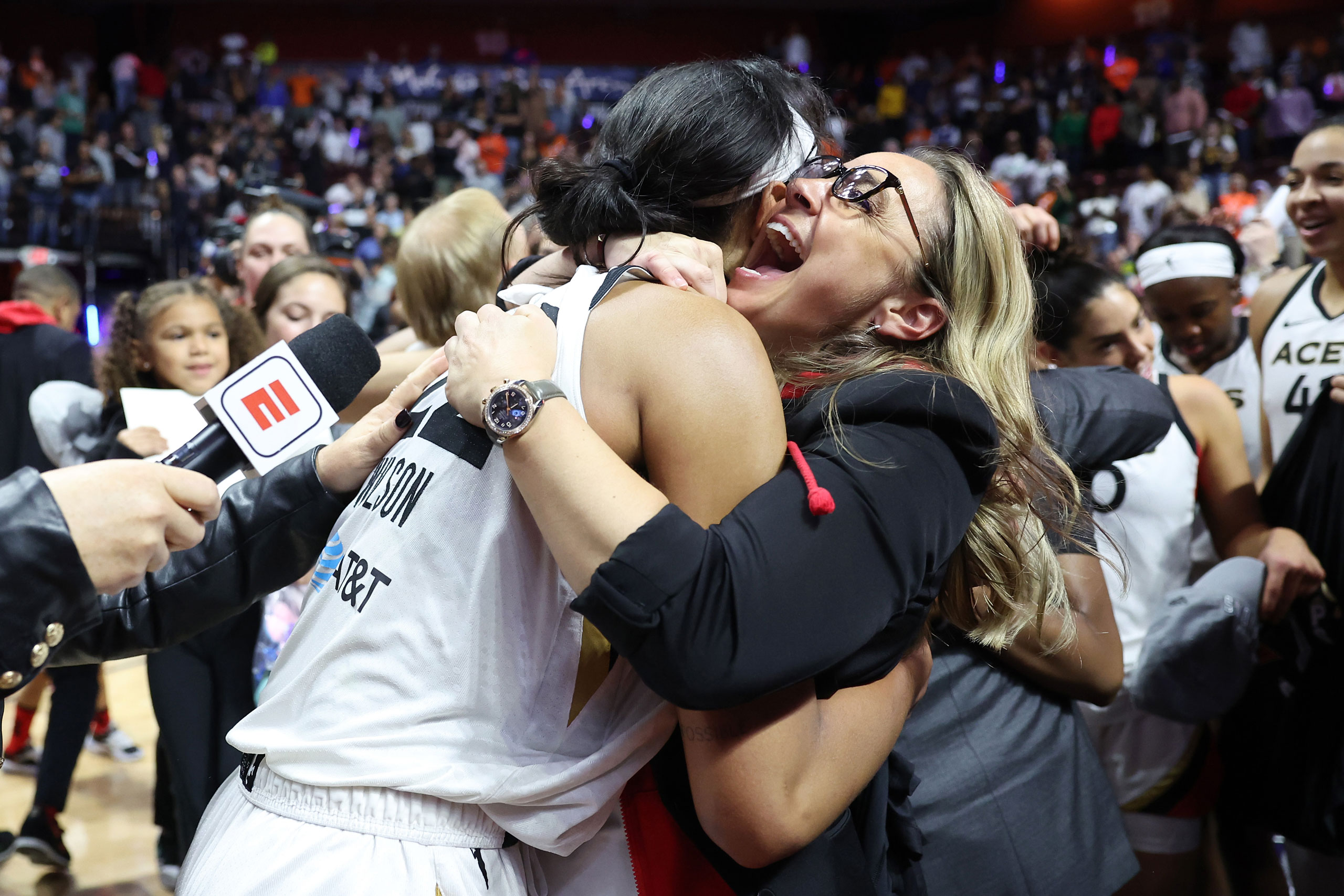
A’ja Wilson of the Las Vegas Aces celebrates with head coach Becky Hammon after defeating the Connecticut Sun in game four to win the 2022 WNBA Finals.
Maddie Meyer—Getty Images
When rumors popped up before training camp that the Raptors were interested in Hammon, Wilson tweeted a link to a report about the outreach, accompanied by the unsmiling emoji. “Becky has been in the game for X amount of years, and she’s been bomb at what she does, and they overlooked her,” says Wilson. “All of a sudden, she comes to us and we’re rocking and rolling and we win and now it’s like, ‘Oh my God, let’s give this woman a chance.’ That’s why I put out the stone-cold straight face. Because she’s been a pot of gold at the rainbow forever. And now that you see a little leprechaun come along, everyone wants the gold.”
On the one hand, the Aces get it. “I am for what is best for the game,” says Parker, who herself has occupied space typically reserved for men, as a studio analyst for NBA games. “It would be huge for women.” On the other hand, Wilson has a point. “Every time she’s texting, I look over her shoulder and go, ‘F-ck Toronto,’” says Plum.
Hammon’s system has unleashed the team’s many talents. She often moved Wilson out of the post to the top of the offense, where the 6 ft. 4 in. forward can use her agility to drive around defenders. She imported the NBA’s love of long-range shooting: Wilson had taken two three-pointers in the four seasons in which she played for former Aces coach Bill Laimbeer. In 2022, under Hammon, Wilson took 83, converting 31 of them—or a respectable 37% of her attempts. (As a team, the Aces shot 96% more threes than they did the previous season, and hit 86% more.)
“When she came, it kind of exposed me to more things I could do on the court,” says Wilson. “I can get my teammates open. I can get myself open. It made me unlock a whole other level of basketball.”
Hammon’s floor-spreading offense relies less on set plays and more on trusting her players to read the defense and make smart decisions. “There were definitely moments, especially at the beginning of the year, where she would pull me aside and be like, ‘Don’t you ever pass up that shot, are you kidding me?’” says Plum, who averaged a career high 20.2 points per game in 2022. “You know she believes in you, so you kind of believe in yourself more. We didn’t have that before.”
Hammon’s Xs and Os acumen was on full display in the playoffs, especially during Game 3 of semifinals against the Seattle Storm. With the best-of-five series tied 1-1 on Seattle’s home court, Hammon called time-outs and drew up three out-of-bounds plays in the last 12 seconds; they all led to Aces baskets. The final hoop came with 1.8 seconds left and Las Vegas down two. Jackie Young ran toward Plum in the corner, as if she were going to screen for her; instead, Young deftly juked her defender, cut toward the basket, took a pass, and banked a layup at the buzzer, forcing overtime.
The Aces dominated in the extra session and closed out the series two nights later to clinch the Finals berth. “She literally probably won us that series,” says Plum.
Now as defending champions and with some flashy new players, the Aces will be a target around the league. If they can win back-to-back titles, they would be the first team in 21 years to do so. On Hammon’s desk, her phone is dinging. She assumes her assistant coaches are wondering why she’s late to a meeting. Opening day—in the WNBA—is approaching. “I know I put in the work,” says Hammon. “And if somebody wants to come and find me, they know where to find me.”
More Must-Reads From TIME














